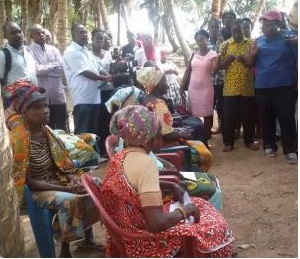The attention of the LEAP Programme under the Ministry of Gender, Children and Social Protection has been drawn to a publication on your website www.ghanaweb.com on Friday, 18th March, 2016, titled ‘Monthly LEAP cash not solution to poverty-IMANI’.
In the said publication, it was stated among others that the LEAP Programme’s achievement of meeting its target of 150,000 households by 2015, only translates to 7.1% of the population living under extreme poverty, and that cannot be a panacea to alleviating extreme poverty.
A LEAP household under the Programme is a group of persons or group of related or unrelated persons who live together in the same housing unit, who acknowledge one adult person as the Head of the Household, and share the same housekeeping and cooking arrangements.
The LEAP social cash grant is a household grant. The Ministry wishes to state that there are currently Seven Hundred and Ninety-One Thousand, Four Hundred and Eighty-Five (791,485) individual beneficiary’s household members under the LEAP Programme, that is an average of 5 LEAP beneficiaries per household.
This figure translates into 37.7% of the extremely poor Ghanaian population of two million, one hundred thousand (2.1million – GLSS 6, 2012) individuals, and not 7.1% that was indicated by IMANI. IMANI was wrongly comparing 150,000 households to two million, one hundred thousand (2.1million) individuals. This was wrong and misleading.
IMANI’s article also wrongly alluded to the fact that nothing is being done to link LEAP beneficiaries to other productive inclusive social protection programmes. There are some initiatives which are being implemented in this regard.
The LEAP Programme has complementary linkages with the Japan Social Development Fund (JSDF) project. The Japan Social Development Fund (JSDF) Project is being implemented under the Ghana Social Opportunity Project (GSOP) to provide livelihood support through skills training in soap making, kente and basket weaving among other skills to LEAP beneficiary household members who have the capacity to work. The JSDF complementary service linkage with LEAP is being implemented in selected districts in the Upper East Region.
LEAP beneficiaries are also being linked to the Labour Intensive Public Work (LIPW) Project under the Ghana Social Opportunity Project (GSOP). Under this initiative, able-bodied members in LEAP households are targeted for labour intensive works in construction activities in their communities where they earn additional income to boost their household income.
Another factual inaccuracy reported in the article is on the amount of cash grant given to the beneficiary households. The amount of cash grant paid to the LEAP beneficiary households varies depending on the number of eligible members per household. A one eligible member household receives Gh¢64.00, two eligible member household receives Gh¢76.00, three eligible member household receives Gh¢88.00 and four or more eligible member household receives Gh¢106.00 every two months, and not the figure of Gh¢24.00 - Gh¢44.00 as stated in the article.
It is important to note that an impact assessment conducted by the Institute of Statistical Social and Economic Research (ISSER) and the North Carolina University in 2012 revealed that the LEAP programme is making impact on its beneficiary households. The Programme has positively impacted on the education of children in beneficiary households in terms of enrollment, grade repetition and absenteeism among others. Another impact assessment is underway and the outcome of the assessment will be shared with all Ghanaians.
Since 2013, the LEAP programme has been under-going reforms aimed at building efficient and effective systems, which are serving as the platform to scale up productive inclusive complementary services across all LEAP households. Some of the reforms are upgrading of Management Information System, transitioning from manual targeting to electronic-targeting, transitioning from manual payment to electronic-payment, and implementation of a robust Monitoring and Evaluation framework developed in collaboration with the Oxford Policy Management (OPM)-UK.
By December 2016, when the Ministry achieves its target of 250,000 Households, the Programme would be covering 59.5% of the extremely poor population of Ghana.The LEAP programme is making significant strides, and it is impacting the lives of its target group - the extremely poor, vulnerable and excluded in society.
Issued by the LEAP Programme
Department of Social Development
Ministry of Gender, Children and Social Protection (MoGCSP)
Regional News of Wednesday, 23 March 2016
Source: Gender Ministry













